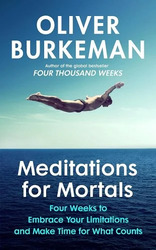
Over the last week, I’ve been meaning to write a blog post about Oliver Burkeman’s Meditations for Mortals: Four Weeks to Embrace Your Limitations and Make Time for What Counts. This morning, my brain had a great idea: Why don’t I create a whole new blog about self-help books? Yes, that’s much better than just writing this one piece. Then I can find the right domain name, fanny around with WordPress, and (best of all) create a content plan in Trello. Excruciatingly, this is exactly the sort of behaviour Burkeman cautions against:
[P]eople try to become a different kind of person as a way to unconsciously avoid doing the activity in question. Suppose you want to start a business, but the prospect intimidates you. What better way to never quite get around to it than to turn it into a long-term project? That way, you get to spend months doing research, and undertaking brainstorming exercises … and you never have to do the scary thing at all. (Page 11)
Ouch. This is what I call the Complexity Trap (having a name for it doesn’t make me immune). Rather than just getting on with the scary thing, I’m often tempted to devise a punishing schedule, preferably one that stretches well into the next year and involves buying a lot of stationery. This is a way of protecting myself from the scary thing. If I have enough padding, it can’t get me. And if I spend the first six months doing research and not creating any outputs, that delays judgement.
A detailed plan also provides a comforting illusion of certainty. I know exactly what I’m going to do every day for the next year, so there’s no room for risk or unexpected outcomes. Not only is this obviously futile, it also drains the life force from any project. In a recent podcast episode, Burkeman discussed with Katherine May how you have to write a book for yourself. It should be about discovering the answer to a question that’s been bugging you. If you’ve already figured it all out, the tone can appear lifeless, trite, and a bit smug. As Burkeman says in the book, this is why self-help books are often lists of what you should do. Those lists are divorced from the struggle the author endured to achieve those insights.
Earlier this year, I coached a client who was writing her first full-length book. A meddling colleague had stressed the importance of planning every aspect in advance, right down to paragraph level. This might sound admirably efficient, but it allows no space for your thinking to develop as you write. Some of the dullest books I’ve read are, I suspect, those where the author has stuck doggedly to a plan. And one of those dull books was a first draft of mine. Yes, you should have a sense of direction, but it shouldn’t be too prescriptive. Although you know where you’re going, you’re allowing yourself the freedom to choose and adjust the route. As you write, you’ll get a better sense of the territory and a clearer route emerges. Your reader follows you on that route, rather than you just showing them the destination.
With bigger writing projects, blogging is an excellent way of working out what you think. If you can’t capture that concept in a 600-word post, how are you going to capture it for a book? That blog post is an important proof of concept. You can always delete it afterwards, but it’s moved you incrementally towards that bigger goal. As Burkeman writes, “Keep making tiny-but-real decisions…” (48) What’s a tiny-but-real step you can take right now? For me, it’s writing another blog post.